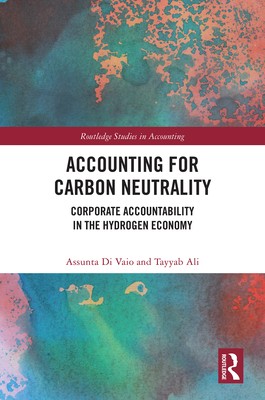
- Išsiųsime per 10–14 d.d.
- Autorius: Assunta Di Vaio
- Leidėjas Routledge
- ISBN-10 : 1032863080
- ISBN-13 : 9781032863085
- Formatas: 15.6 x 23.4 x 1.6 cm, kieti viršeliai
- Kalba: Anglų
- Extra -15 % nuolaida šiai knygai su kodu: ENG15
Atsiliepimai
Aprašymas
Despite the progress made so far, the links between environmental, social and governance (ESG) sustainability pillars remain underexplored, particularly in the context of firms investing in hydrogen for decarbonization. In essence, hydrogen is a lynchpin connecting engineering ingenuity, economic viability, and strategic business decisions. Its multifaceted role underscores its significance in addressing contemporary challenges, driving innovation, and shaping a sustainable future through the accounting system.
This book unravels the complexities of carbon control practices, offering insights into financial, operational, and sustainable dimensions. From the challenges of sustainability transitions, green technology adoption, use of renewable resources, reporting and disclosure of decarbonization practices posed by carbon emissions to the responsibilities of businesses actions in achieving zero-carbon goals, the book explores the critical role of accounting tools and international regulatory frameworks such as the United Nations (UN) 2030 Agenda, the European Union Green Deal, and Paris Agreement as organizational collective responsibility in shaping a sustainable future for people, planet, prosperity, peace, and partnership.
The book draws from stakeholder, institutional, legitimacy, resource dependency, agency, stewardship theories, bridging the gaps in fragmented academic research, and offers an innovative interpretative key to the phenomenon of decarbonization in the hydrogen economy. The book's qualitative methodological approach offers a unified vision from strategies to actions, guiding companies toward their contribution to carbon neutrality goals in the hydrogen economy, and holding them accountable for their actions, behavior, and sustainability reporting.
EXTRA 15 % nuolaida
Kupono kodas: ENG15
Akcija baigiasi už 17:44:06
Nuolaidos kodas galioja perkant nuo 10 €. Nuolaidos nesumuojamos.

- Autorius: Assunta Di Vaio
- Leidėjas Routledge
- ISBN-10: 1032863080
- ISBN-13: 9781032863085
- Formatas 15.6 x 23.4 x 1.6 cm, kieti viršeliai
- Kalba: Anglų
Despite the progress made so far, the links between environmental, social and governance (ESG) sustainability pillars remain underexplored, particularly in the context of firms investing in hydrogen for decarbonization. In essence, hydrogen is a lynchpin connecting engineering ingenuity, economic viability, and strategic business decisions. Its multifaceted role underscores its significance in addressing contemporary challenges, driving innovation, and shaping a sustainable future through the accounting system.
This book unravels the complexities of carbon control practices, offering insights into financial, operational, and sustainable dimensions. From the challenges of sustainability transitions, green technology adoption, use of renewable resources, reporting and disclosure of decarbonization practices posed by carbon emissions to the responsibilities of businesses actions in achieving zero-carbon goals, the book explores the critical role of accounting tools and international regulatory frameworks such as the United Nations (UN) 2030 Agenda, the European Union Green Deal, and Paris Agreement as organizational collective responsibility in shaping a sustainable future for people, planet, prosperity, peace, and partnership.
The book draws from stakeholder, institutional, legitimacy, resource dependency, agency, stewardship theories, bridging the gaps in fragmented academic research, and offers an innovative interpretative key to the phenomenon of decarbonization in the hydrogen economy. The book's qualitative methodological approach offers a unified vision from strategies to actions, guiding companies toward their contribution to carbon neutrality goals in the hydrogen economy, and holding them accountable for their actions, behavior, and sustainability reporting.



Atsiliepimai